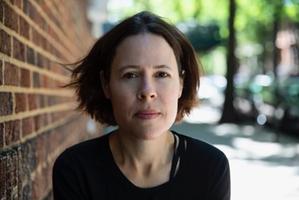 |
|
| (photo: Jake Chessum) | |
Anne Napolitano's novel Dear Edward will be published by Dial Press in January 2020. She is the author of the novels A Good Hard Look--which appeared on the Southern Independent bestseller list and NPR's Best of 2011 list, and was an Indie Next Pick and an Okra Pick--and Within Arm's Reach. She is also the associate editor of One Story literary magazine. She received an MFA from New York University, and has taught fiction writing for Brooklyn College's MFA program, New York University's School of Continuing and Professional Studies and for Gotham Writers' Workshop. Napolitano lives in Brooklyn, N.Y., with her husband and two children.
Your prose is a delight. I assume there is a progression in refining your craft. How do you experience that?
My hope and desire is for my writing to get better with each book. The plot and the characters and the structure remain a challenge in every book, of course, but the construction of sentences, and my control of language, should ideally improve. It took me eight years to write Dear Edward. I love re-writing--I honestly think my books are pretty bad for the first five years of the writing process, and then eventually get closer to what I hoped they might be.
I also have a writing group. I've been meeting with the writers Helen Ellis (Southern Lady Code and American Housewife) and Hannah Tinti (The Twelve Lives of Samuel Hawley and The Good Thief) for over 20 years. We met in graduate school, and we are one another's first readers. I would not be the writer I am, without them.
The characters in Dear Edward are carefully and lovingly drawn. Teenagers can be tough to write about convincingly, and your details about Edward "after" are so effective. How did you get into Edward's and his friend Shay's heads so well?
Edward was the starting place for me. I think I was helped by the fact that he was inspired by a real person--a Dutch boy named Ruben Van Assouw who was the sole survivor of a plane crash in 2010. My entry into the book was trying to imagine how this young boy would feel in this terrible situation, and how he could possibly go on and live a life. I spent a year taking notes, thinking and doing research before I started writing, and that gave me time to settle into Edward's point of view.
I don't know anyone who has experienced a tragedy like this. A lot of it was imagining myself into Edward's situation, but I was also helped by an experience I had when I was 20--I became sick with a powerful virus called Epstein-Barr and for over a year my immune system was wiped out (which meant I caught every illness around) and I was deeply fatigued. I felt 80 years old, even though I appeared to be 20. There was a terrible isolation in that period of my life, when I faked feeling normal with my friends, and faked being young. That sensation of isolation and the experience of that illness fed into my empathy for Edward.
And Shay really showed up as herself--I can take very little credit for her.
Jordan, Edward's older brother, is one of my favorite characters. His initial methods of separating into adulthood are believable (and often amusing). And his relationship with Edward is so dear.
When I started writing Dear Edward, my sons were one and three years old. At that age the only thing I could definitively say about them was that they were deeply in love with each other. This was a surprise to my husband and me--I have siblings, but we bickered a lot when we were young. We certainly never snuggled with each other for comfort, the way my boys have since the very beginning. They seem to be connected by a million invisible threads. When I started writing about Edward, my sons' devotion made its way into his and Jordan's relationship. It's hard for me to imagine something worse happening to one of my boys than losing their brother, and that was baked into my understanding of Edward's loss.
The other characters on the plane are fully formed, with minimal information. They have stayed with me. And one--Benjamin--stays with Edward. He thinks about the soldier every day.
Benjamin is the only passenger Edward has a conversation with on the plane, other than his family. He was a man who Edward knew, however fleetingly, and lost. Also, Edward feels so weak and vulnerable in the aftermath of the crash that the literal strength of Benjamin is appealing.
I spent a year thinking about who I wanted to write about on the plane, and I read books and did research on each of those characters before I started writing. For Benjamin, I spoke to a friend of mine who's in the army, and I read War by Sebastian Junger.
Edward is composed of everyone he's ever touched: "He has molecules inside him from his parents and Jordan and everyone else on that plane."
The idea that we're all truly interconnected fascinates me, and I was happy to be able to write my way into understanding the possibilities within that concept. I also felt like Edward needed to drop--or ignore--common boundaries in order for the world to feel survivable to him. The plane, and his family, needed to still be in the sky. He and his brother needed to still love each other. And he needed to carry everyone on the plane--their loss, their loves--inside him. The letters from the families of the other victims ultimately give him a sense of purpose and understanding. They had questions that they were asking of him, which makes no sense, but there was nowhere else for them to send their correspondence. Only when Edward allows for the possibility that connection is hopeful, and even necessary, does he begin to heal. --Marilyn Dahl

